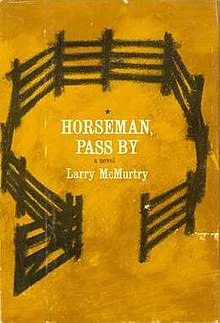Horseman, Pass By
This article needs additional citations for verification. (August 2015) |
 First edition | |
| Author | Larry McMurtry |
|---|---|
| Country | United States |
| Language | English |
| Genre | Modern western |
| Publisher | Harper |
Publication date | 1961 |
| Media type | Print (hardback and paperback) |
Horseman, Pass By is a Western novel by American writer Larry McMurtry. His first novel,[1] it was published when he was 25.[2] This 1961 Western portrays life on a cattle ranch from the perspective of young narrator Lonnie Bannon. Set in post-World War II Texas (1954), the Bannon ranch is owned by Lonnie's grandfather, Homer Bannon. Homer's ruthless stepson, Hud, stands as the primary antagonist of the novel. The novel inspired the film Hud, starring Paul Newman as the title character.
The title of the novel derives from the last three lines of the poem "Under Ben Bulben" by William Butler Yeats, which are carved on Yeats’s tombstone:
Cast a cold eye
On life, on death.
Horseman, pass by.
Plot[]
Seventeen-year-old Lonnie lives on a Texas ranch with his grandfather Homer Bannon, Homer's wife Jewel, and her adult son Hud. While a good cowboy, Hud does whatever he wants, regardless of others. They also have a new worker, Jesse, and a cook Halmea, a friendly African-American woman who is treated respectfully by Homer. Hud is nasty towards her, and Lonnie tries to be nice to her; both of them are attracted to her but she is uninterested.
The prologue briefly explains life on the ranch and the backstories of everyone there.
One day, one of Homer's young heifers dies suddenly. The dead animal is found to have foot-and-mouth disease, and it has spread to the rest of the herd. All cattle on the ranch are led into a deep pit dug by bulldozers. They are shot and buried.
During this time, Hud rapes Halmea, the cook who fed them, causing her to leave. Lonnie and Halmea shoot at him but miss. Halmea tries to kill him, but Lonnie just wants to scare him, to no avail. Lonnie goes to the town rodeo, only to see his friend Hermy get seriously hurt in a bull riding accident when a bull stomps on and shatters his chest. Lonnie heads back to the ranch with Hud in a car behind him.
Lonnie spots Homer on the side of the highway and stops without warning, causing Hud to rear-end him. Homer is injured and bloody, with the tip of a bone protruding from his chest. Hud sends Lonnie to flag down a car, but Lonnie is unsuccessful. Hud shoots Homer while he is gone. Lonnie is very upset by this, but Hud says it is the best thing he could do due to the physical pain he was in and would most likely never fully recover. The book ends with Homer's funeral. When Hud tells Lonnie he must come along with them to the graveyard, Lonnie pulls away and runs behind the church. He thinks about his grandfather and the fact that he now gets to stay with his land forever, a thought that makes him feel better about probably losing the ranch. He stands outside the church "thinking of the horseman that had passed."
An epilogue is quickly narrated by Lonnie. He explains how he left Homer's funeral to see his injured friend, Hermy. He hitches a ride with a truck driver who knew Homer. When he asks how he is doing all Lonnie says is, "Mean as ever". The driver tells numerous stories about bulls, his wife, and his kids. Lonnie says to the reader how he reminds him of everyone he knows.
The book, despite being less popular than most other McMurtry books, is praised. Many compare it to Thomas Wolfe's work and to J. D. Salinger's 1951 classic The Catcher in the Rye.[citation needed]
References[]
- ^ McMurtry, Larry (2008). Books : a memoir (1st Simon & Schuster hardcover ed.). New York: Simon & Schuster. p. 59. ISBN 9781416583349.
- ^ "The Fort Scott Tribune - Google News Archive Search". news.google.com.
- 1961 American novels
- Western (genre) novels
- Novels by Larry McMurtry
- American novels adapted into films
- Harper & Brothers books
- Novels set in Texas
- Fiction set in 1954
- 1961 debut novels